BIOGRAPHY
| Birch, Tony | On Kim Scott |
| Hamilton, Margaret | Falling forward |
Return to top
CLASSIC
| Aurelius, Marcus | Meditations |
Return to top
COOKING
| Woods, Mindy | Karkalla at home |
Return to top
CRAFT
| Yefimova, Kateryna | Amigurumi gnomes |
Return to top
GARDENING
| Richards, Huw | The self-sufficiency garden |
| The Country Women’s Association | Thrifty gardening |
Return to top
GENERAL FICTION
| Bentley, Don | Capture or kill |
| Bergmoser, Gabriel | The hitchhiker |
| Downing, Samantha | A twisted love story |
| Haig, Matt | The life impossible |
| Hardwick, Brooke | The fog |
| Kanon, Joseph | Shanghai |
| McFadden, Freida | The housemaid is watching |
| Mupotsa-Russell, Mark | The hitwoman’s guide to reducing household debt |
| Newman, Sandra | Julia |
| Newman, T. J. | Drowning |
| Olson, Karleah | A wreck of seabirds |
| Pitzorno, Bianca | The seamstress of Sardinia |
| Riley, Lucinda | The hidden girl |
| Serong, Jock | Cherrywood |
| Shafak, Elif | There are rivers in the sky |
| Strout, Elizabeth | Tell me everything |
| Thompson, Alicia | Ex |
| Woods, Tess | The Venice hotel |
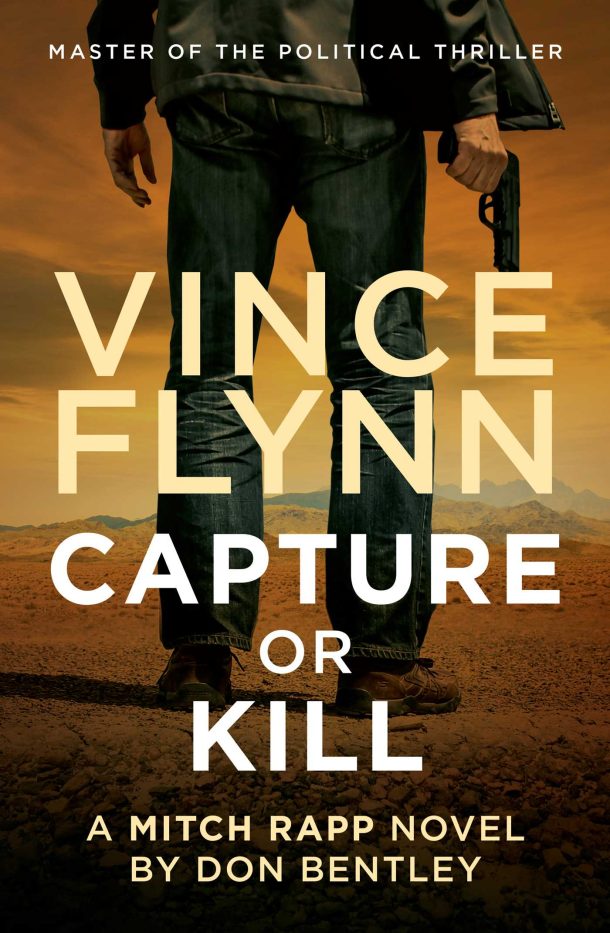 Capture or Kill by Don Bentley
Capture or Kill by Don Bentley
Bentley’s first Mitch Rapp thriller in the series begun by the late Vince Flynn and continued by Kyle Mills. In 2011, saboteurs have blown up an Iranian nuclear facility, and Iran swears vengeance. Against whom, they don’t know yet. The head of Iranian intelligence, Azad Ashani, is dying of cancer and wants to both prevent a calamitous war and protect his family. But he sees his only chance as making a deal with the devil: “Malikul Mawt. The Angel of Death.” Mitch Rapp. Mitch surely merits that sobriquet, yet the author makes clear that the CIA operative is “neither a sociopath nor a troubled soul” but more like a plumber just doing his job, unclogging drains. Lots of drains. “Mitch was created to hunt his nation’s enemies on their turf,” that’s all. Over the nearly two dozen books in the series, he’s killed enough bad guys to fill a small phone book. His persona is a bit over the crest of believability: “Managing Rapp wasn’t so much riding a bridleless mustang as trying to surf a tsunami.” “The man seemed born to kill terrorists in the same way in which Eddie Van Halen had been born to play guitar.” And to borrow a phrase, he jumps the shark when he plunges headfirst down a waterfall. But hey, what’s a hero for? He works in coordination with Army Rangers to “capture or kill” a high-value target—Osama bin Laden—over the Pakistani border in Abbottabad. The action hardly ever lets up, so Rapp’s legion of readers will find plenty to worry about—and enjoy. Author Bentley has successfully spun yarns in the Tom Clancy universe, and here he moves smoothly into Vince Flynn’s. Their writing styles and that of Kyle Mills are indistinguishable, as if they could slip into each other’s skins. There’s even a passing nod to Mark Greaney’s Gray Man, another plague on the world’s bad guys. Action junkies will gobble this up. Kirkus Reviews, August 2024
 Shanghai by Joseph Kanon
Shanghai by Joseph Kanon
In this superbly written WWII espionage thriller, Edgar winner Kanon (The Berlin Exchange) introduces Daniel Lohr, a German Jew who escapes 1938 Berlin for Shanghai, the only port city that doesn’t require an entry visa. On the journey there, Daniel’s unexpected liaison with fellow passenger Leah Auerbach is overshadowed by a close call with Colonel Yamada, an officer in the dreaded Japanese military police and a close ally of the Nazis. When Daniel arrives in Shanghai, he takes refuge with his uncle, Nathan, who operates a casino and a jazz club while steadily expanding his partnership with Chinese mob bosses across the city. After surviving a gang-related ambush that nearly kills Nathan, Daniel rises to prominence in Shanghai’s criminal underworld. However, his obsession with Leah and hatred of Yamada threaten to undermine him as he navigates the combined perils of Shanghai’s German-allied Japanese occupation, the city’s ballooning gang violence, and the psychological pressures of his own refugee status. From the opening paragraph, it’s clear readers are in expert hands: Kanon writes with a master’s touch, flexing his gift for atmosphere and crafting characters who seem capable of walking off the page and taking a seat next to the reader. With pulse-pounding suspense, top-shelf dialogue, and a palpable evocation of its period setting, this is as good as crime fiction gets. Publishers Weekly, August 2024
 Julia by Sandra Newman
Julia by Sandra Newman
Newman (The Men) delivers a provocative feminist retelling of George Orwell’s 1984 from the perspective of Julia Worthing, a mechanic working on the machines in the Ministry of Truth’s Fiction Department, where she’s become a master at subverting surveillance. As a result, Julia enjoys a healthy clandestine sex life and averts the ever-present threat of the ironically named Ministry of Love’s “eyeless mice gnawing at her in the dark.” She soon becomes fascinated by Records Department colleague and fellow apostate Winston Smith, whom she dubs “old Misery.” Unlike Orwell’s Julia, Newman’s is dominant and fastidious. Still, Newman stays true to Orwell’s dystopian details as she places Julia at the center of 1984’s plot points, such as having her feign allegiance and alliance to Big Brother and avoid even the suggestion of malfeasance and the horrors of Room 101 at all costs, until she can’t. Julia’s narrative voice is refreshingly fearless as she navigates her way around the Party’s nefarious thought policing, and a wicked plot twist spins the original narrative on its ear. Newman adds a fresh coat of menacing gray to Orwell’s gloomy world. Publisher’s Weekly, August 2023
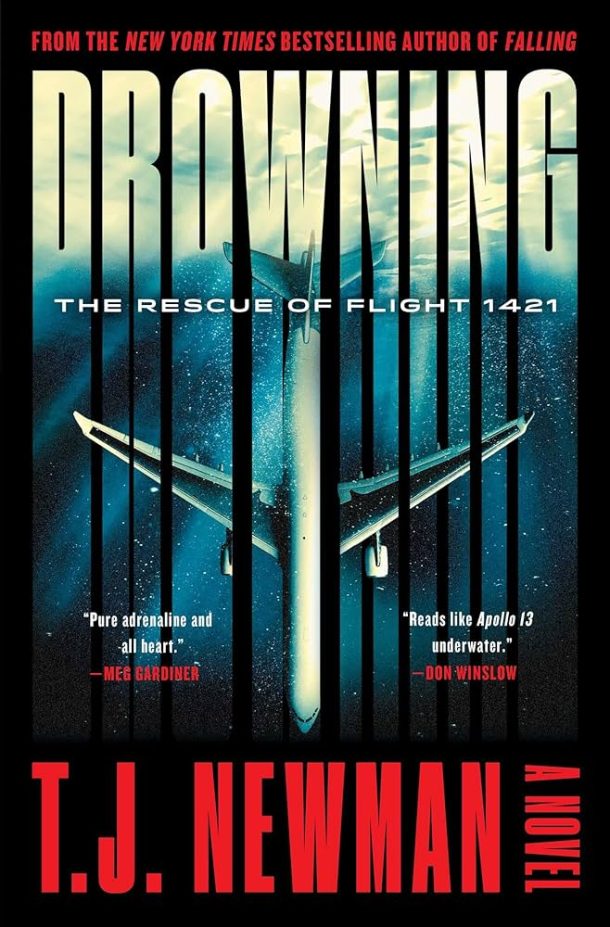 Drowning by T.J. Newman
Drowning by T.J. Newman
A spectacular aviation thriller that readers will be relieved to know is fiction. Just off the coast of Hawaii, Flight 1421’s engine explodes minutes after takeoff with 99 souls aboard. With no controls, “the plane was dead in the air,” and the pilot makes an emergency landing into the Pacific Ocean, with inevitable but disastrous results. Although some people perish on impact, “the worst was yet to come.” The survivors are left with a Hobson’s choice: escape the airplane and hope the burning jet fuel on the ocean’s surface doesn’t kill them or stay in the fuselage and probably drown when it sinks and is crushed by the depths. Twelve passengers and crew remain alive in the Airbus, including Will Kent and his 11-year-old daughter, Shannon. On a nearby island, Will’s soon-to-be-ex-wife Chris learns about the crash and decides to help in the rescue efforts. By an amazing coincidence, she just happens to have all the engineering, scuba diving, and spot-welding chops to complement her fierce Mama Bear personality. Meanwhile, Will convinces a few passengers to stay inside the sinking fuselage as they desperately look for ways to keep the structure watertight. In an important subplot, Will and Chris separately reflect on what had gone so terribly wrong in their family: Their older daughter, Annie, had died years before, and neither parent knows how to cope with that pain. Now Chris faces still more losses: her family, the remaining passengers and crew, and perhaps her own life. The wrecked Airbus is balanced on the precipice of a cliff 200 feet below the surface, close to the limits of where anyone can come to help. If it falls off the edge, all hope is lost. If readers can get past a few hair-raising and cringeworthy early scenes, they’ll find themselves engrossed in this darned good thriller. A taut, gripping yarn. Not for the weak-kneed. Kirkus Reviews, March 2023
 The Seamstress of Sardinia by Bianca Pitzorno
The Seamstress of Sardinia by Bianca Pitzorno
Pitzorno’s sparkling English-language debut follows a poor Sardinian orphan girl’s coming-of-age as she becomes a seamstress, opera lover, and independent young woman. At five, in 1900, the unnamed narrator loses her parents in a cholera epidemic. She’s taken in by her grandmother, Nonna, a seamstress who teaches her to sew. By age seven, the girl is helping with the work, and well-to-do brides teach her to read and offer her novels, periodicals, and opera libretti in exchange for sewing their trousseaux and layettes. Nonna dies when the narrator is 16, and she manages to sidestep the pitfalls awaiting young women of the lower classes thanks to her sewing skills and literacy. Though finding work is sometimes a struggle, she survives the lean times with her dignity intact and catches operas from the nosebleed seats. Independent women—including a bicycle-riding American journalist and the beneficent, globe-trotting Marchesina Ester—provide moral and financial support. A tantalizing suitor appears, but the narrator’s problems are resolved more through courage, self-sacrifice, and honesty than through love or money. Minutely described period clothing and memorable characters conveyed via Maher’s seamless translation add to the charm. This sumptuous costume drama has a great deal of heart. Publisher’s Weekly, September 2022
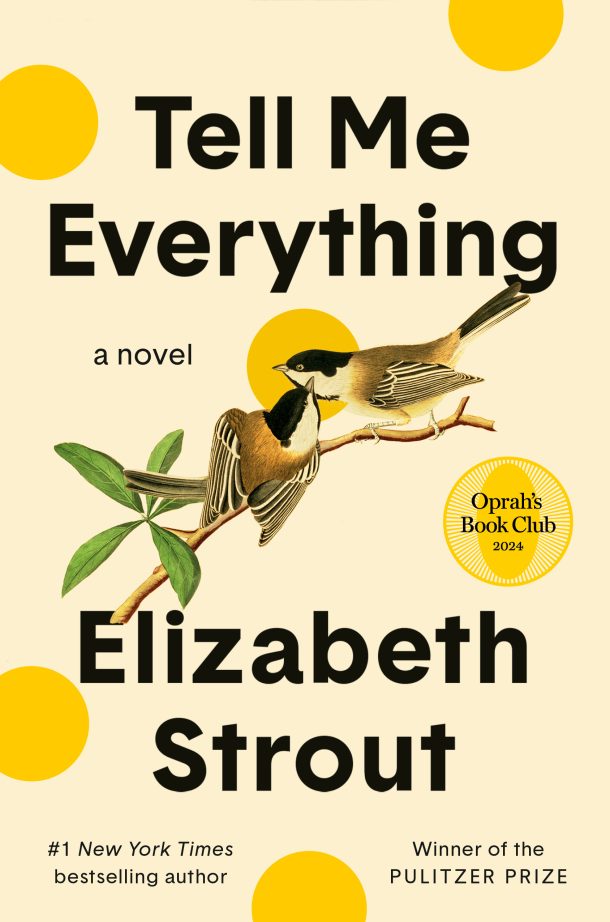 Tell me Everything by Elizabeth Strout
Tell me Everything by Elizabeth Strout
The latest from Pulitzer winner Strout (Olive Kitteridge) brings together characters from her previous novels for a masterly meditation on storytelling. After 86-year-old Mainer Gloria Beach is found dead in a quarry, semi-retired lawyer Bob Burgess agrees to represent Gloria’s son, Matthew, who is the prime suspect in her possible murder. Bob has grown close to author Lucy Barton, who moved to the area from New York City during the pandemic, and the duo spend hours walking together and chatting. After Bob takes Matthew’s case, Lucy calls him a “sin eater,” a term that came to her mind during a recent chat with Olive Kitteridge, who’s been inviting Lucy over to her retirement community to gossip about their neighbors. As Bob works with Matthew on preparing his defense in the event of a murder charge, he begins to wonder if he’s falling in love with Lucy. Though Olive doesn’t say anything, she’s been convinced all along that Lucy and Bob are developing feelings for each other. The narrative threads make for dishy small-town drama, but even more satisfying are the insights Strout weaves into the dialogue. Late in the novel, after Olive asks Lucy the point of writing stories, she responds, “People and the lives they lead. That’s the point.” Longtime fans and newcomers alike will relish this. Publishers Weekly, June 2024
Return to top
HISTORICAL FICTION
| Barker, Pat | The voyage home |
| Harris, Robert | Precipice |
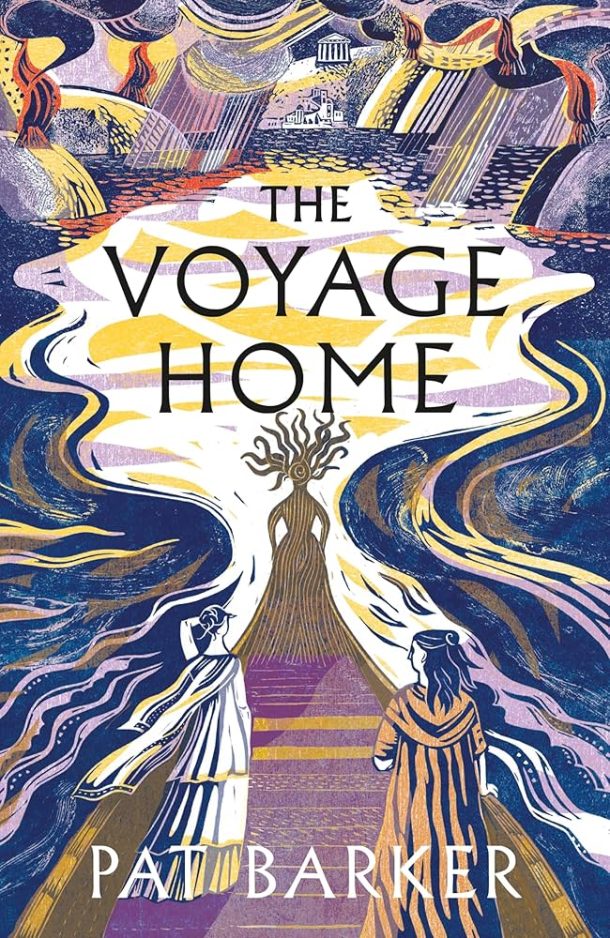 The Voyage Home by Pat Barker
The Voyage Home by Pat Barker
Barker (The Silence of the Girls) recounts the aftermath of the Trojan War in this tense third entry in her Women of Troy series. With the city in ruins, victorious King Agamemnon and his Greek army sail home to Mycenae. On the ship, King Priam’s daughter Cassandra, once a virgin priestess and now a concubine, endures Agamemnon’s abuse. Apollo gave Cassandra the gift of prophesy but made sure no one would believe her. Now, on approach to Agamemnon’s royal palace, she foresees two dead bodies in the courtyard: hers and the king’s. Agamemnon also has a troubled mind—he sacrificed his own daughter, Iphigenia, to assure victory at Troy, and now he sees her ghost on the ship. Meanwhile, at the palace, Queen Clytemnestra plots to murder Agamemnon for killing Iphigenia. But the queen has her own enemies—her son Orestes and daughter Electra. The narrator, Ritsa, is another beleaguered woman. A Trojan survivor enslaved by Cassandra, she’s resigned to a life of subjugation. Barker suffuses the wrenching narrative with the women’s simmering contempt for the men who rule their world. Readers will relish this fierce feminist retelling. Publishers Weekly, Aug 2024
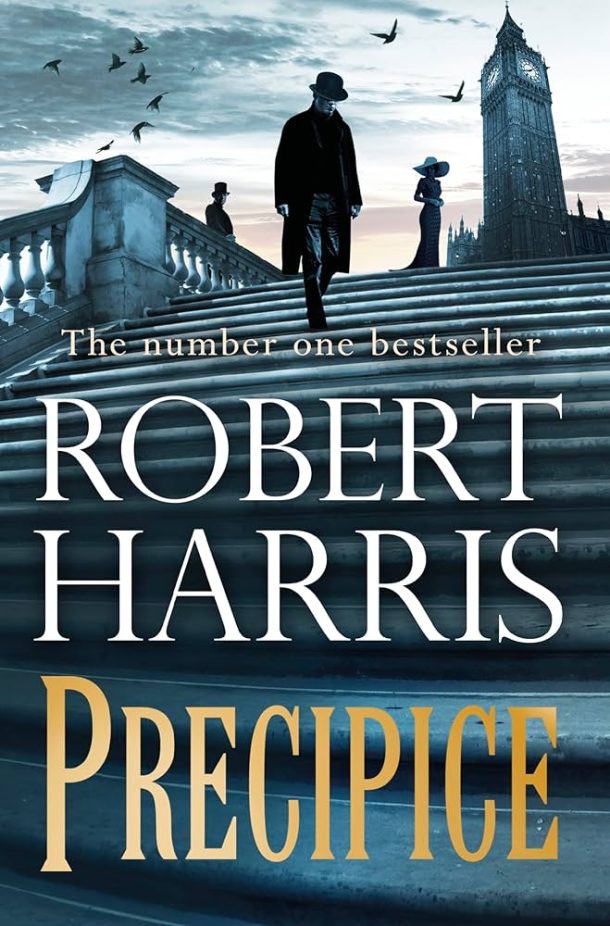 Precipice by Robert Harris
Precipice by Robert Harris
A World War I novel of love, politics, and a continent gone mad. In 1914, British prime minister H.H. Asquith, a 61-year-old married man, carries on an affair with 26-year-old Venetia Stanley. Those surrounding the two know of their friendship but not of its depth, though some wonder. Asquith harbors an obsession with Venetia—when they’re apart, he writes her letters up to three times a day, expecting and generally receiving prompt responses. Meanwhile, DS Paul Deemer investigates the accidental drowning of Asquith’s son. Since Venetia was listed as a witness, he questions her. But with a war in the offing, he’s told by higher-ups at Scotland Yard to also quietly investigate the odd relationship that some suspect. “Prime,” as Venetia calls her lover, feels the constant need to tell her what’s happening at the office. When war breaks out, he shares secret information with her: troop requirements, battle losses, ammunition shortages—all by regular mail, reminding her not to share what she learns. “The enclosed telegram from our Ambassador at Petersburg wh. came on Friday night will interest you,” one note says. The narrator notes: “A thin sheet of Foreign Office paper was a poor exchange for sweet verbena, but it was the only bouquet he had. What greater proof could he offer of his love, of his dependence on her, of his absolute confidence in her loyalty and discretion?” Never mind dependence; the man is nearly driven to distraction. Meanwhile, Deemer steams open the intercepted envelopes, reports to his boss, and sends the letters on their way. German spies are thought to be everywhere in Britain. Fortunately, Deemer is not one of them. A grisly war is on, to which politicians and generals send young men to die by the tens of thousands, to the benefit of no one. Over 100,000 soldiers on both sides perish at the Dardanelles in Turkey because of Churchill’s insistence on attacking there. The world has indeed gone mad, but Venetia hasn’t. She wants to become a frontline nurse, but to do that she must extricate herself from her needy lover. The pair are real historical figures, while Deemer is fictional. The letters from Asquith are genuine, while the author invented those from Venetia. Asquith apparently burned them. A foolish affair and a horrible war that will grab and hold readers’ attention. Kirkus Reviews, July 2024
Return to top
MYSTERY
| Atkinson, Kate | Death at the sign of the rook |
| Burton, Sarah | Eliza Mace |
| Campbell, Lucy | Lowbridge |
| Casey, Jane | A stranger in the family |
| Conyer, Natalie | Shadow city |
| Craven, M. W | The mercy chair |
| Dent, Susie | Guilty by definition |
| Dunbar, James | Mole Creek |
| Hammer, Chris | The valley |
| Harris, C. S. | What cannot be said |
| Holmes, Rupert | Murder your employer |
| Hunter, Tony | Gus and the missing boy |
| May, Peter | The Black Loch |
| McCall Smith, Alexander | The great hippopotamus hotel |
| Mead, Tom | Death and the conjuror |
| Osman, Richard | We solve murders |
| Jonasson, Ragnar | Death at the sanatorium |
| Robb, J. D. | Passions in death |
| Sager, Riley | Middle of the night |
| Welsh, Irvine | Resolution |
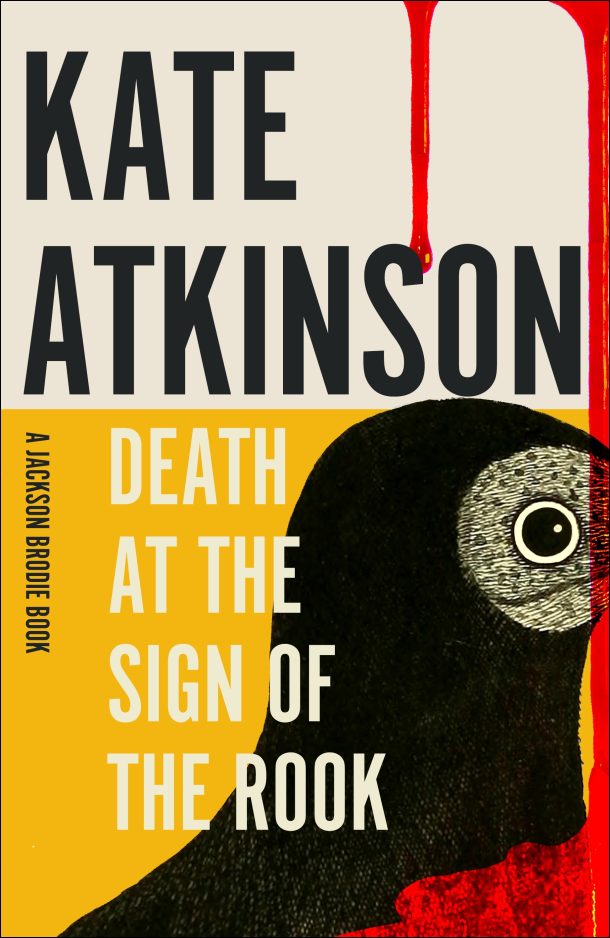 Death at the sign of the rook by Kate Atkinson
Death at the sign of the rook by Kate Atkinson
Atkinson’s deliciously witty sixth adventure for Jackson Brodie (after Big Sky) finds the British PI entangled in a weekend-long murder mystery party. Brodie’s newest clients are Ian and Hazel Padgett, “pensionable-aged” siblings who have discovered, while divvying up their deceased mother’s possessions, that one of her oil paintings has gone missing. With the help of his friend, Det. Const. Reggie Chase, Brodie digs into the siblings’ suspicions that their mother’s caretaker, Melanie Hope, swiped the heirloom. Soon, Brodie and Chase’s investigation unearths art thefts linked to Burton Makepeace House, a crumbling mansion recently converted into a hotel and managed by the self-aggrandizing Piers Milton. Brodie and Chase head to Burton Makepeace and start poking around while an elaborate “Murder Mystery Weekend” event that Piers has organized is underway; before long, a snowstorm strands the duo with the participants and knocks out everyone’s cell reception. Atkinson keeps things fast, funny, and fair, delivering a twist-filled mystery that will stump armchair sleuths and a well-sketched supporting cast that’s easy to fall in love with. This is sure to delight series fans and newcomers alike. Publishers Weekly, June 2024
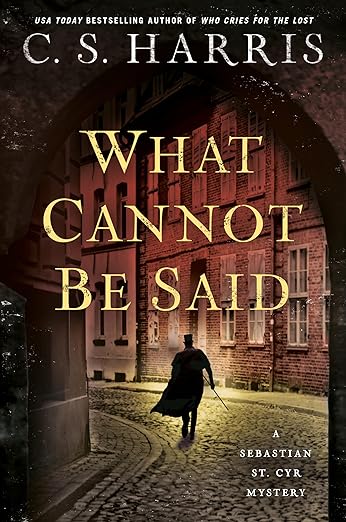 What Cannot Be Said by C.S. Harris
What Cannot Be Said by C.S. Harris
Harris returns with a refreshingly fast-paced Regency-era whodunit featuring sleuth Sebastian St. Cyr (after Who Cries for the Lost). In the summer of 1815, two brothers hear gunshots and discover the corpses of Lady McInnis and her daughter, Emma, in London’s Richmond Park. When Bow Street magistrate Sir Henry Lovejoy arrives on the scene, the women’s strange poses—like “the stone effigies one often saw atop medieval tombs”—immediately reminds him of the murders of his wife and teenage daughter 14 years earlier. They were killed in the same spot, with their bodies arranged in the same manner, and Lovejoy’s investigation led to the arrest and execution of a disturbed former soldier. Fearing he may have hanged an innocent man while the real killer remained at large, Lovejoy taps Sebastian to launch his own probe into the recent deaths. As Sebastian digs into Lady McInnis’s potential infidelity and her conflicts with a beloved local man named Basil Rhodes, two more bodies turn up. Harris manages to keep even the most savvy readers in the dark throughout, while offering up vivid historical color and satisfying twists. This installment ranks with the series’ best. Publisher’s Weekly, March 2024
 The Great Hippopotamus Hotel by Alexander McCall Smith
The Great Hippopotamus Hotel by Alexander McCall Smith
Smith’s breezy latest outing for Botswanan sleuths Precious Ramotswe and Grace Makutsi (after From a Far and Lovely Country) finds the pair digging into the operations of a struggling hotel. While Mma Ramotswe is shopping for socks one afternoon, a man named Quick Babusi approaches her with an inquiry: the well-regarded Great Hippopotamus Hotel, which Babusi manages, has recently fallen into disrepair, with the kitchen causing a spate of inexplicable food poisonings and guest rooms becoming overrun with snakes and scorpions. Mma Ramotswe taps Mma Makutsi and her best friend, Mma Potokwani, to help with the case, and together, they uncover a conspiracy targeting the hotel’s reputation. Meanwhile, a wealthy client asks Mma Ramotswe’s mechanic husband, Mr. J.L.B. Matekoni, to procure him a new South African sports car, which Matekoni fears the man will use to facilitate an affair. As always, the sleuthing takes a backseat to Mma Ramotswe and company’s dryly funny musings (many of them focused on middle-aged men’s difficulties with aging) and Smith’s evocative descriptions of life in Gaborone. Series fans will get just what they came for. Publishers Weekly, August 2024
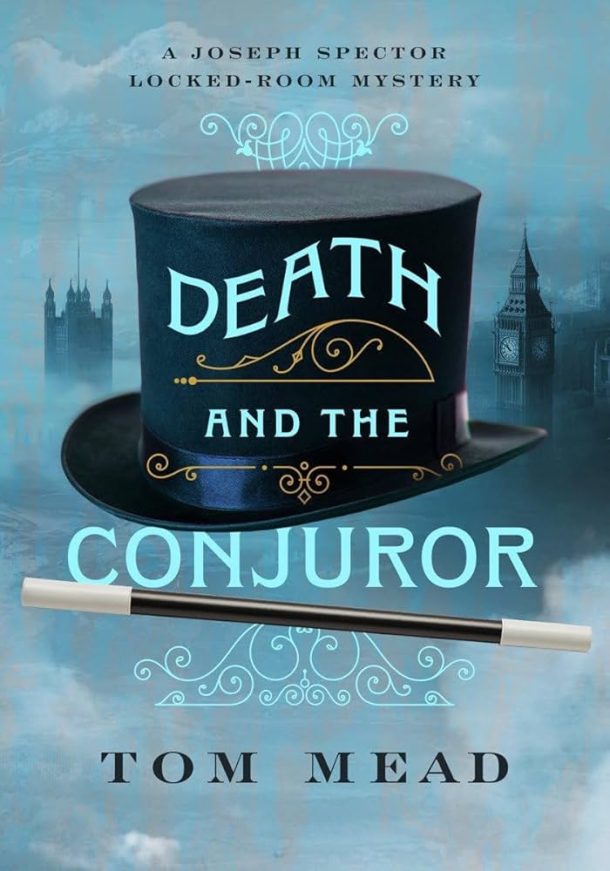 Death and the Conjuror by Tom Mead
Death and the Conjuror by Tom Mead
Set in London, Mead’s stellar debut and series launch, an homage to golden age crime fiction, in particular the works of John Dickson Carr, introduces magician Joseph Spector. In 1936, Spector’s Scotland Yard friend, Insp. George Flint, consults him in the baffling case of Austrian psychotherapist Anselm Rees. The doctor was found dead in his study with his throat slit so deeply that his head was almost decapitated. As the room’s door and windows were locked, Flint hopes Spector, a master of conjuring tricks and misdirection, can explain how anyone could have committed the crime and left the room sealed. The pair pursue the theory that the murder was a revenge killing after learning that one of Rees’s Viennese patients cut his own throat in a similar manner. Meanwhile, they must also probe two other cases: the apparently connected murder of a possible witness in an elevator that no one but the victim had access to, and the impossible theft of a rare artwork. Mead maintains suspense throughout, creating a creepy atmosphere en route to satisfying reveals. Puzzle mystery fans will eagerly await the sequel. Publisher’s Weekly, April 2022
 We Solve Murders by Richard Osman
We Solve Murders by Richard Osman
Bestseller Osman (the Thursday Murder Club mysteries) launches a promising new series with this sprightly tale of a father- and daughter-in-law who join forces to take down a shadowy killer. At the outset, bodyguard Amy Wheeler is on an island off the coast of South Carolina shielding bestselling novelist Rosie D’Antonio from a Russian oligarch who threatened to kill her after she used his real name in her latest book. While Amy and Rosie discuss the recent deaths of two popular influencers, someone takes a shot at them, and they narrowly escape. Meanwhile, private detective Steve Wheeler—father to Amy’s husband, Adam—is in the Hampshire village of Axley searching for a client’s lost dog when Amy calls to ask for his backup. He agrees, and as he helps Amy try to determine who tried to kill her (and why), more influencer bodies start piling up, the crime scenes strewn with evidence framing Amy for the murders. Steve and Amy then embark on a globetrotting quest to pin down their adversary that takes them from Ireland to Dubai. Osman pulls off the tricky task of making his leads both zany and human, with a sufficiently brain-teasing mystery to boot. This series is sure to garner a loyal following. Publisher’s Weekly, July 2024
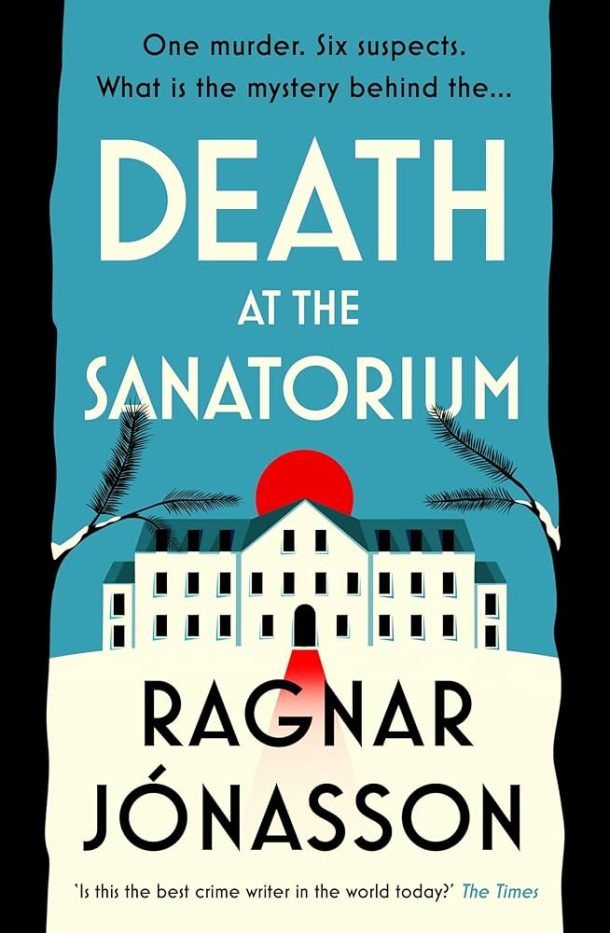 Death at the Sanatorium by Ragnar Jonasson
Death at the Sanatorium by Ragnar Jonasson
The retro title introduces a valentine to Golden Age whodunits relocated to Iceland. Helgi Reykdal, a graduate student in criminology at an English university, has returned to Iceland. Last summer he interned with Reykjavík’s criminal investigation department, and there’s a job waiting for him there if he wants it. But he’s torn by his conflicting desires to return to the U.K. and to appease Bergthóra, the increasingly violent live-in girlfriend who wants him to stay. An additional inducement arrives with the possibility of writing his dissertation on the deaths a generation ago of a nurse and doctor at a sanitorium in the provincial northern town of Akureyri. When both Tinna Einarsdóttir, the nurse who discovered both bodies, and Sverrir Eggertsson, the police investigator who allegedly solved the case back in 1983 by arresting what even he came to admit was the wrong suspect, summarily refuse to talk to him, his interest is naturally piqued. The circle of possible killers is tiny—Tinna herself, along with her colleague Elísabet, ambitious Dr. Thorri Thorsteinsson, and Broddi the caretaker—and in the course of Helgi’s investigation, one of them obligingly narrows it even further by killing one of the others. Inspired by his reading of classic mysteries with similar settings, from Patrick Quentin’s A Puzzle for Fools to Ellery Queen’s The Dutch Shoe Mystery, Helgi digs into the archives and questions the people who are willing to talk to him. The story, which toggles back and forth between 1983 and 2012, generates considerable suspense from a remarkably limited cast of characters living and dead. Clever, absorbing, and no more uplifting than you’d expect from this master of Icelandic noir. Kirkus Reviews, Aug 2024
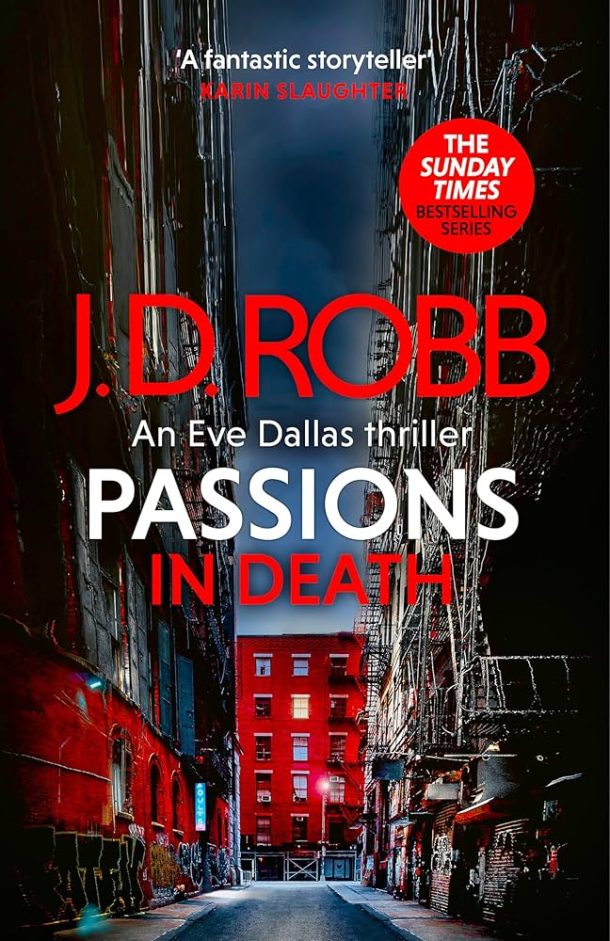 Passions in Death by J.D. Robb
Passions in Death by J.D. Robb
Lieutenant Eve Dallas is called out of bed to investigate the late-night strangling of a bride-to-be at her and her fiancee’s joint bachelorette party. On top of her wedding to Fancy Feet shoe store manager Shauna Hunnicut a few days away, street artist Erin Albright is looking forward to something else: a surprise honeymoon in Maui, a trip Shauna’s always dreamed of taking, that Erin’s financed by unexpectedly selling three paintings. Feverish with excitement, Erin ducks into a privacy room at the sex club Down and Dirty to don her Hawaiian apparel but never comes out. Assuming from the get-go that “somebody Albright knew and trusted killed her,” Dallas and her partner, Det. Delia Peabody, question Erin’s studio mates and the friends she shared with Shauna in search of someone who objected to her marriage enough to kill her—or a collector of her canvases looking for a quick and dirty way to drive up their prices. In an investigation that’s unusually sharply focused for this futuristic series, Dallas and Peabody initially spend most of their time spitballing theories about possible killers and checking the alibis of the leading candidates. As the grind grinds on, things get distinctly more interesting when they narrow their focus to two favored suspects: Shauna’s ex-lover Greg Barney, who’s now the cohab of the brides’ mutual friend Becca DiNuzio, and Erin’s ex-lover ChiChi Lopez, a stripper who clearly enjoys displaying her body to paying audiences. They both fit the profile that consulting psychologist Dr. Mira provides to a T. So which of them did the deed—or was it someone else entirely? Steadily rising tension more than makes up for the absence of surprises. This is, after all, a procedural. Kirkus Reviews, July 2024
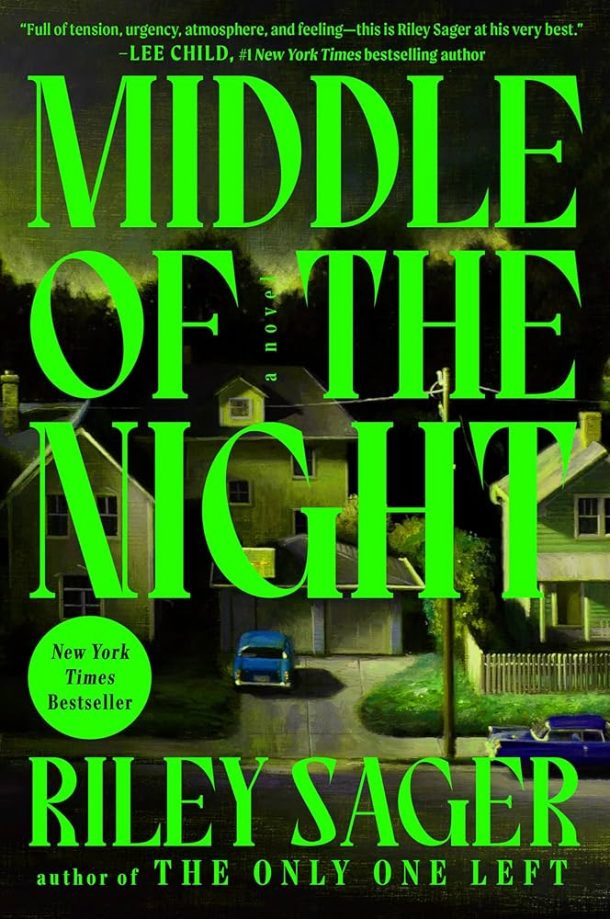 Middle of the Night by Riley Sager
Middle of the Night by Riley Sager
Bestseller Sager (The Only One Left) expertly doles out chills and pathos in his mesmerizing latest. In 1994, when Ethan Marsh was 10 years old, his best friend, Billy Barringer, was kidnapped from the tent where both boys were sleeping in Ethan’s New Jersey backyard and never seen again. Thirty years later, Ethan’s marriage has ended, his parents have decamped to Florida, and he’s returned to live on the well-to-do cul-de-sac where he grew up. Still plagued by nightmares about Billy’s disappearance, Ethan comes to believe that someone may be lurking in the shadows of Hemlock Circle: neighbors’ motion-sensor lights flick on for no apparent reason; he senses a presence “linger[ing] in the way certain smells do” when he’s out for night walks. His paranoia increases when someone tosses a baseball into his yard, the private signal Billy used to give him when he wanted to play. Could Billy have returned? Or is his kidnapper back for seconds? Sager takes his time ratcheting up the tension, peppering in crucial flashbacks that flesh out Ethan and Billy’s friendship and painting a three-dimensional portrait of Ethan’s fractured mind in the present. This standout work of psychological suspense confirms that Sager has few equals when it comes to merging creepiness and compassion. Publishers Weekly, February 2024
Return to top
NON FICTION
| Downer, Lesley | The shortest history of Japan | 952 DOWN |
| Fowler, Andrew John | Nuked | 359.93 FOWL |
| Harari, Yuval Noah | Nexus | 909 HARA |
| Millas, Juan Jose | Life as told by a sapiens to a neanderthal | 121.68 MILL |
| Smith, Julie | Why has nobody told me this before? | 155.24 SMIT |
| Smithers, Annie | Recipe for a kinder life | 640.41 SMIT |
| Stafford, Andrew | Pig city | 781.66 STAFF |
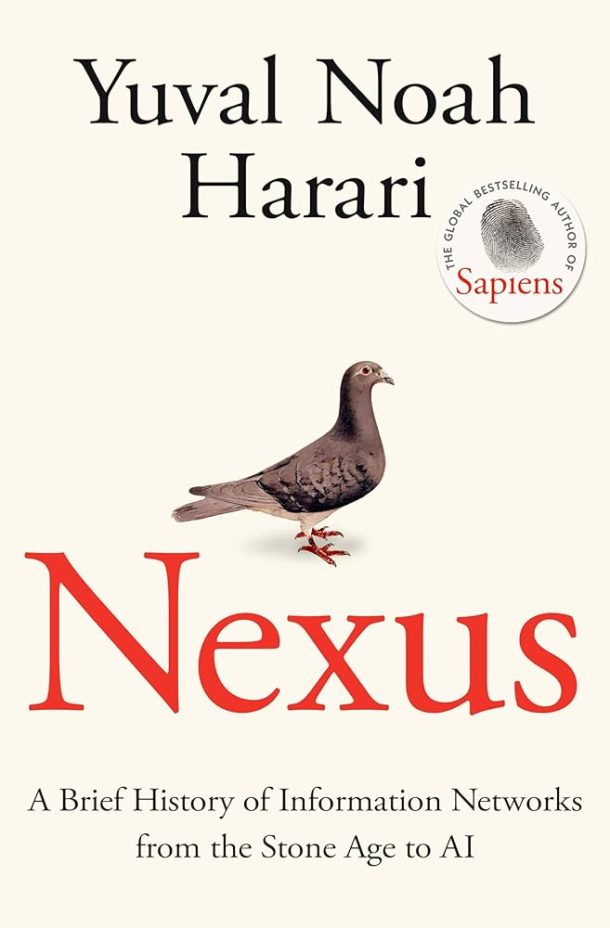 Nexus by Yuval Noah Harari
Nexus by Yuval Noah Harari
The author of Homo Deus considers the future of information networks. His international bestseller laying out ideas on human destiny is a hard act to follow, but Harari manages. The first part examines past information networks, leading with the intriguing declaration that “most information is not an attempt to represent reality.…What information does is to create new realities by tying together disparate things.” What that means is that “errors, lies, fantasies, and fictions are information, too.” Information is often wrong, and more information does not necessarily improve matters, so it’s essential that institutions contain self-correcting mechanisms. Our Constitution receives high marks for allowing amendments; holy books considered infallible, like the Bible and Quran, create problems and “hold important lessons for the attempt to create infallible AIs.” The second part deals with governments whose information networks maintain a balance between truth and order, arguing that just as sacrificing truth for the sake of order comes with a cost, so does sacrificing order for truth. Modern technology enabled large-scale democracy as well as large-scale authoritarianism and totalitarianism. Harari deplores the conception that democracies operate through majority rule. In fact, he argues, democracies guarantee everyone liberties that even the majority cannot take away. This is a sophisticated concept that current events suggest is not universally accepted, and recent advances in artificial intelligence may be an additional destabilizing force. Harari warns that modern societies controlled by carbon-based life forms (us) must deal with inorganic, silicon-based networks (AI) that, unlike the printing press, the radio, and other inventions, can make decisions and create ideas by themselves. AI’s ability to gather massive amounts of information and engage in total surveillance “will not necessarily be either bad or good. All we know for sure is that it will be alien and it will be fallible.” Confronting the avalanche of books on the prospects of AI, readers would do well to begin with this one. Kirkus Reviews, July 2024
 Life as Told by a Sapiens to a Neanderthal by Juan Jose Millas
Life as Told by a Sapiens to a Neanderthal by Juan Jose Millas
Novelist Millás (From the Shadows) and paleontologist Arsuaga combine forces in this introspective and playful exploration of human prehistory and evolution. Millás, the “Neanderthal” of the title, provides the humor, scene-setting, and wordplay, while “Sapiens” Arsuaga, the director of the Museum of Human Evolution, details such complex evolutionary concepts as bipedal locomotion, dietary adaptation, domestication, and social complexity. On their travels through Spain, the pair uncover living connections between past and present and explore what defines humanity. A trip to a Madrid playground, for example, leads to a discussion of 16th-century anatomist Andreas Vesalius and the “utter marvel that is bipedalism,” while a visit to see a 14,000-year-old cave painting reveals how “clever” and “incredibly vain” prehistoric humans were: “They spent the whole day painting their bodies, decorating themselves to look good,” says Arsuaga. “To my mind, this represents a collective mood; if people are depressed, they let themselves go.” Attention is also paid to local cuisine and landmarks, adding to the book’s travelogue feel. Erudite yet fun, this is an illuminating trip into the past. Publishers Weekly, July 2024
Return to top
SCIENCE FICTION & FANTASY
| Aaronovitch, Ben | The masquerades of spring |
| Harris, Charlaine | An easy death |
| Maas, Sarah J. | A court of mist and fury |
| Novik, Naomi | Buried deep and other stories |
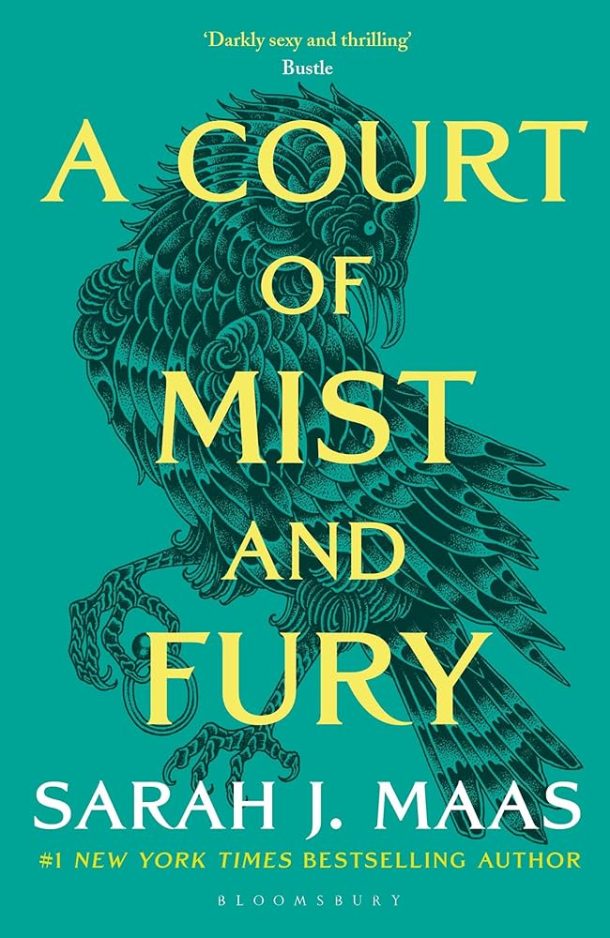 A Court of Mist and Fury by Sarah J. Maas
A Court of Mist and Fury by Sarah J. Maas
After the events of A Court of Thorns and Roses (2015), Feyre struggles to pull herself back together while imminent threats loom. In the months after defeating Amarantha and escaping hellish captivity Under the Mountain, Feyre hasn’t been doing well. She’s drowning in guilt over the prices she paid and unable to escape the feeling that she’s trapped. Tamlin is perhaps coping even worse—he’s consumed by the fear of failing to protect her and in denial. While their physical relationship is mutually pleasurable—and graphically hot—their happily-ever-after fairy-tale wedding is further derailed by Rhysand, the High Lord of the dreaded Night Court, who demands that Feyre fulfill their bargain by coming with him (one week a month). Rhys believes war is coming, and he needs Feyre for his dangerous scheme to win it. As Feyre travels between courts and explores the consequences of her resurrection, she learns more about Prythian, its history, and peoples (including its darkest sides: misogynistic cultures and tensions between High Fae and lesser faeries). Occasionally the characters fall too neatly into wholly good or completely bad boxes, which at its least subtle comes across as manipulative of readers, but the large cast provides relief from Feyre’s deep psychological wounds. The erotically charged lead-up to the romantic storyline’s climaxes (pun intended) adds stakes to the cliffhanger. Hits the spot for fans of dark, lush, sexy fantasy. Kirkus Reviews, March 2016
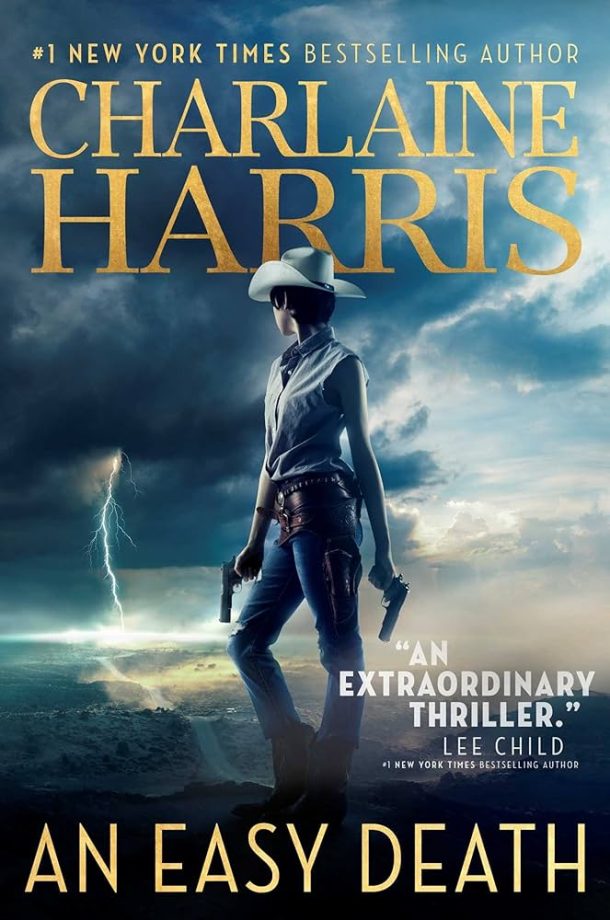 An Easy Death by Charlaine Harris
An Easy Death by Charlaine Harris
In a bleak alternate history of what’s left of a broken-up United States after Franklin Roosevelt is assassinated—where poverty is rampant and magic is real but not widely accepted—Harris (the Midnight, Texas series) tells the harrowing story of a young bodyguard, Lizbeth “Gunnie” Rose, whose job is to keep others alive. After her team and closest friends are killed in a mission gone wrong, Rose is forced to move on for the sake of survival, even if it means taking a gig protecting those she’s spent her life hating: two Russian wizards, or grigoris, who have come to town looking for another wizard. She tells them he’s dead, but doesn’t mention that she killed him—or why. It’s not until she’s too deep into the search for his brother that she finds out her own life is in danger: these wizards are more hunted than they realized, but she may be the one the hunters really want. In this fast-paced thriller fueled by magic and gunslinging, no one can be trusted. Harris’s vividly detailed story will leave readers enthralled with the fascinating setting and a heroine who’s sure to be a new fan favorite. Publishers Weekly, October 2018
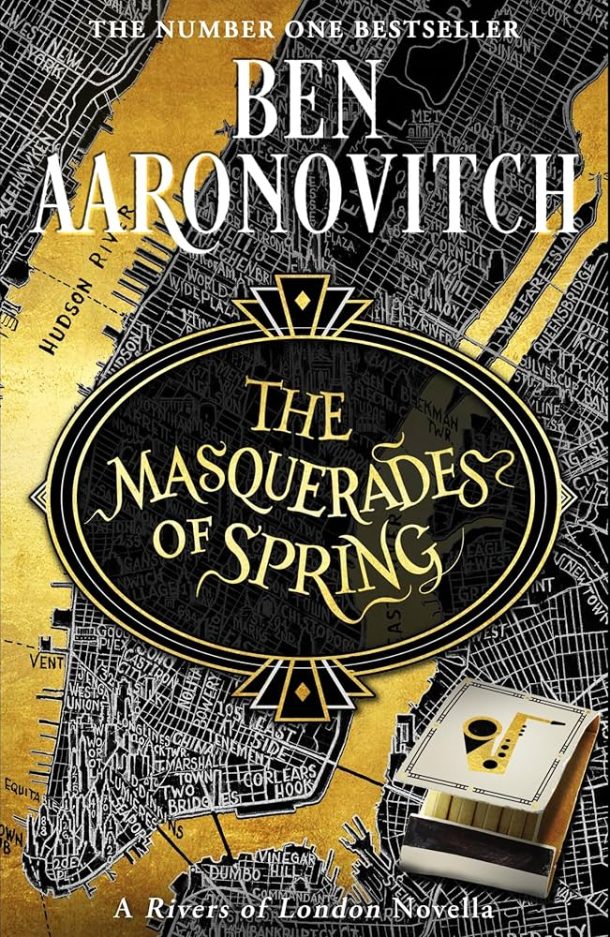 The Masquerades of Spring by Ben Aaronovitch
The Masquerades of Spring by Ben Aaronovitch
Aaronovitch goes full P.G. Wodehouse in his sixth Rivers of London fantasy (after Winter’s Gifts), cleverly integrating comedic elements into a supernatural plot. Augustus “Gussie” Berrycloth-Young is a member of the Folly, the covert British organization who were entrusted by Isaac Newton with safeguarding the knowledge of magic “back in the age of enormous wigs.” But after Gussie uses the mystic arts for a prank, ticking off his superiors, he exiles himself to Manhattan, where he finds a Jeeves-like valet, Maximillian Beauregard, and the love of his life: copywriter Lucien Gibbs. Gussie’s new day-to-day is disrupted when Thomas Nightingale, the man whom the Folly “send forth into the world to solve problems and shoot trouble,” arrives at his Manhattan apartment on a quest for the provenance of an enchanted saxophone believed to have been touched by the devil himself. Gussie’s love for and expertise on the New York City jazz world proves an asset to this caper, which is heavier on laughs than chills. It’s an absolute joy. Publishers Weekly, June 2024
Return to top
New additions to eBooks at SMSA
EBOOKS
| General | James, Amanda | The garden of memories |
| General | Norman, Hilary | Prey |
| General | Wiener, Gabriela | Undiscovered |
| Historical | Paice, Christine | The oxenbridge king |
| Mystery | Burrowes, Grace | A gentleman in challenging cirumstances |
| Mystery | Carlyle, Rose | No one will know |
| Mystery | Hammer, Chris | The valley |
| Mystery | Penrose, Andrea | Murder at King’s Crossing |
| Mystery | Rosett, Sara | Murder among the pyramids |
| Non-Fiction | Ford, Andrew | The shortest history in music |
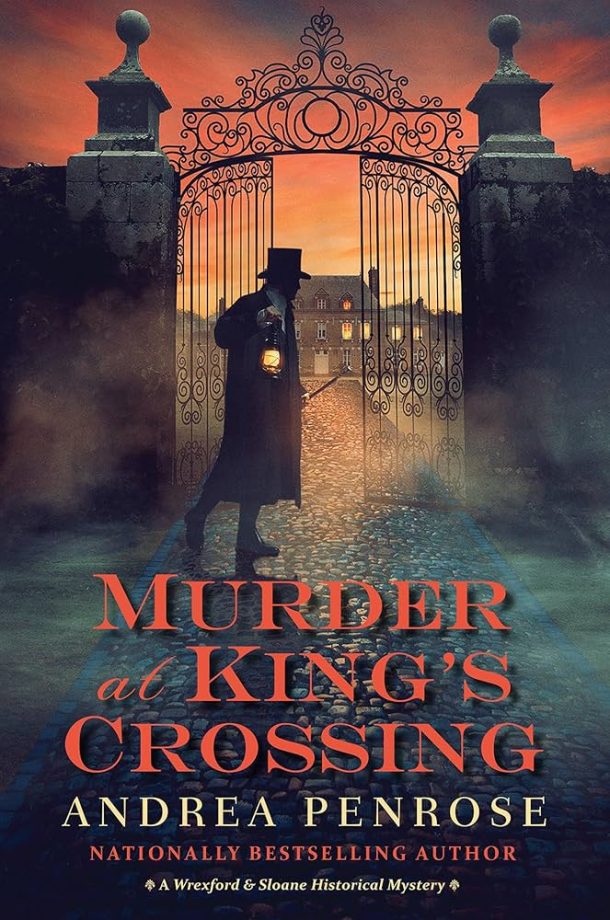 Murder at King’s Crossing by Andrea Penrose
Murder at King’s Crossing by Andrea Penrose
Penrose maintains a brisk pace in her finely wrought eighth Regency-era adventure for the Earl of Wrexford and his cartoonist wife, Charlotte Sloane (after Murder at the Merton Library). At the outset, the couple has offered their country home for the wedding of their friends Christopher Sheffield and Lady Cordelia Mansfield. The festivities take a grim turn when police discover the body of Lady Cordelia’s childhood friend, mathematician Jasper Milton, beneath a nearby bridge, with her cousin Oliver’s invitation in his pocket. Cordelia enlists Wrexford and Charlotte to investigate, and the sleuths quickly become entangled in a Gordian knot of international intrigue involving Milton’s groundbreaking mathematical theories about bridge construction. Penrose elegantly weaves insights about the period’s politics and technological innovations into a splendid mystery that offers a peek at the darker corners of Eton, the elite British boys’ school, which becomes crucial to Wrexford and Charlotte’s investigation as they learn of Milton’s connections to the school. This reliable series continues its winning streak. Publisher’s Weekly, August 2024
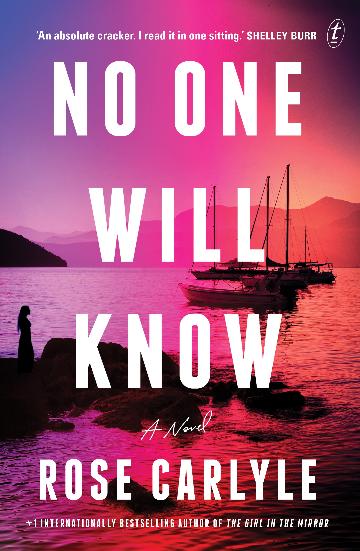 No One Will Know by Rose Carlyle
No One Will Know by Rose Carlyle
Pregnant, homeless, and alone, 24-year-old Eve Sylvester is faced with a desperate future when a meeting at her dead fiancé’s gravesite offers a chance too glorious to refuse: nannying for the wealthy Hygate family on their secluded Tasmanian island. Upon arriving, she is quickly hidden from sight before the truth about Julia and Christopher Hygate’s generosity is revealed: they are a childless couple who want to raise her baby and give it a near-perfect life. In return, they offer to hire her as the nanny, allowing her to care for her child. The psychological warfare in Eve’s mind—whether she is there voluntarily or trapped—never eases, creating a tension that keeps readers vigilant on every page. The environment may be one of gentle seas, picturesque islands, enormous homes and soft furnishings, but Eve is held captive by her circumstances. While readers may doubt her choices, the real threat of homelessness and a solitary, painful life is not to be dismissed, especially considering Eve’s upbringing in foster care. With a heightened atmosphere and pages so taut readers may stumble into the next reveal, Rose Carlyle’s No One Will Know is a simmering thriller for readers who enjoy Paula Hawkins, Petronella McGovern, and Carlyle’s debut, The Girl in the Mirror, along with authors such as Liane Moriarty whose captivating characters explore the complexities of family. Books Publishing, August 2024
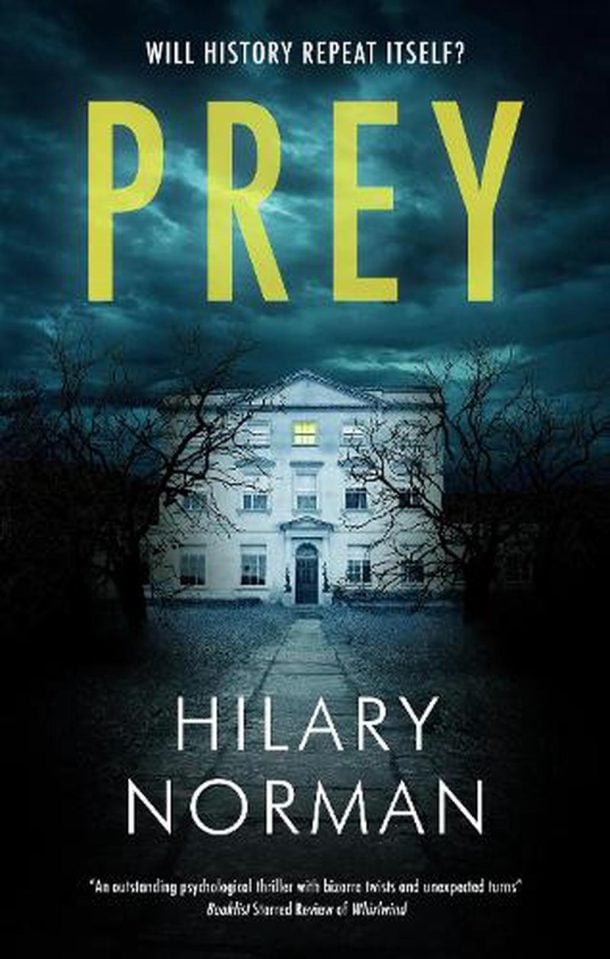 Prey by Hilary Norman
Prey by Hilary Norman
Two English women are stalked by deadly killers, one in 1941 and one in 2019. One night during the Blitz, Harriet, who shares her home, Calla House, with several lodgers, is out walking her dog George when she’s attacked and chloroformed. When she wakes up, she’s tied up in a room with photographs of redheads like her pinned to the walls. Her captor tells her he “likes” her, so he won’t kill her outright; he’ll simply take her to a bomb site and bury her alive beneath the rubble. Fortunately, George escapes and alerts Harriet’s love interest, Jack, who resolves to rescue her. Fast-forward 50 years, and Libby, Harriet’s granddaughter, now lives in Calla House, also with several lodgers. While out walking the dog, Libby is attacked, but she escapes; one of her lodgers vanishes; and things mysteriously disappear from her room. Libby fears that she’s becoming paranoid when she even begins to mistrust her lover, Lucas. The situation quickly escalates into grave danger for Libby as she discovers shocking links to her grandmother’s abduction and a horrific plot to exact revenge. The suspense builds from page one and escalates to a fever pitch in this intense, spine-chilling thriller. Booklist, August 2024
 Undiscovered by Gabriela Wiener
Undiscovered by Gabriela Wiener
Peruvian writer Wiener (Sexographies) plumbs the depths of her family history while exploring the legacy of colonialism in this incisive work of autofiction. The narrator, a self-described “chola” or dark-skinned Peruvian woman named Gabriela, lives in Spain in a queer polyamorous triad, and is proud of her nontraditional life. Then her beloved father dies, and she returns to Peru in mourning. There, she inquires into the lives of patriarchal figures further back in her family’s history, including her great-great-grandfather, the Austrian-French explorer Charles Wiener, who brought Indigenous artifacts back to Europe for display. As she researches her ancestor, she also learns about her father and his infidelities. Weiner shifts seamlessly from the intimate to the historical, often with humor (on Charles Wiener’s writings on Bolivia and Peru: “He is… without a doubt, the creator of the story’s hero: himself. Had he lived in the twenty-first century, he might have been accused of the worst possible crime an author can be accused of today: writing autofiction”). Weiner’s slim and affecting novel will whet readers’ appetites for more. Publisher’s Weekly, July 2023
Return to top
AUDIOBOOKS
| General | Campbell, Lucy | Lowbridge |
| General | Eason, Lynette | Target acquired |
| General | Fischer, Maribeth | A season of perfect happiness |
| General | Whelan, Julia | Thank you for listening |
| Mystery | Baylis, Claire | Dice |
| Mystery | Cahoon, Lynn | One poison pie |
| Mystery | Devlin, Cara | Nature of the crime |
| Mystery | Roberts, Terry | A Short Time to Stay Here |
| Mystery | St. James, Dorothy | A book club to die for |
| Non-Fiction | Renkl, Margaret | The comfort of Crows |
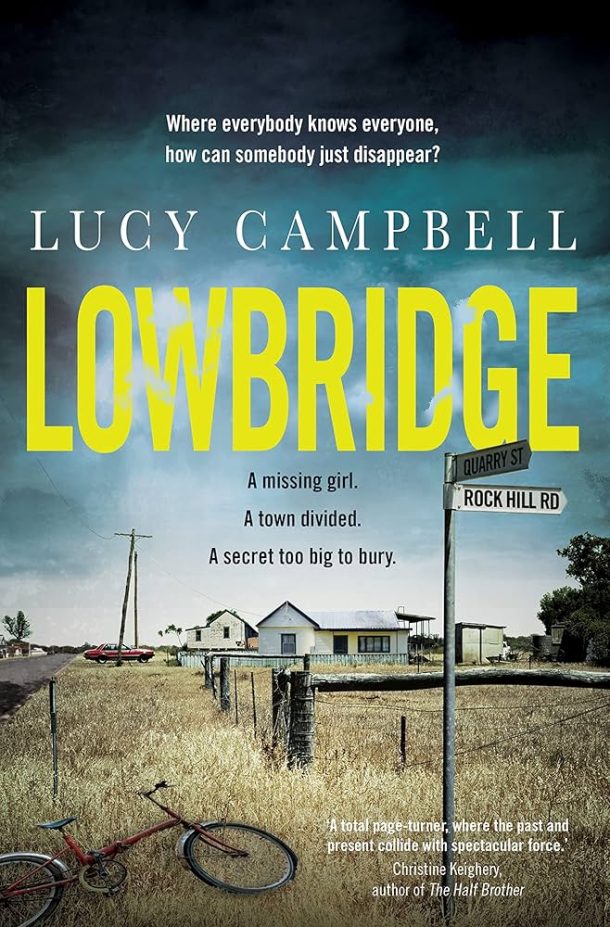 Lowbridge by Lucy Campbell
Lowbridge by Lucy Campbell
In Lowbridge, Lucy Campbell’s debut crime thriller, the people in the sleepy small town of Lowbridge seem to have moved on with their lives after the tragic events of the summer of 1987, when 17-year-old Tess Dawes went missing. However, 32 years later, when newcomer Katherine Ashworth is grieving the loss of her own daughter, she begins digging into what really happened and starts asking questions. The novel is filled with small-town tension and maternal grief, as Katherine becomes obsessed with uncovering the truth behind the disappearance of two girls and the dark secrets buried behind closed doors. Campbell richly paints the lives of small-town teenagers during the 1980s. The community is reeling from the socioeconomic divide of the region, as well as the political ramifications, associated protests and controversy of a planned Women’s Clinic that turn national attention onto the town. Campbell expertly moves from past to present and back again as the summer’s tragic events unfold, building tension between the characters until the very last page. Fans of Jane Harper’s Exiles, Shelley Burr’s Wake and Hayley Scrivenor’s Dirt Town will be hooked as Lowbridge brings a tragic small-town mystery and community divide into the spotlight, uncovering long-buried secrets and grief that lingers throughout the decades. Books Publishing, May 2023
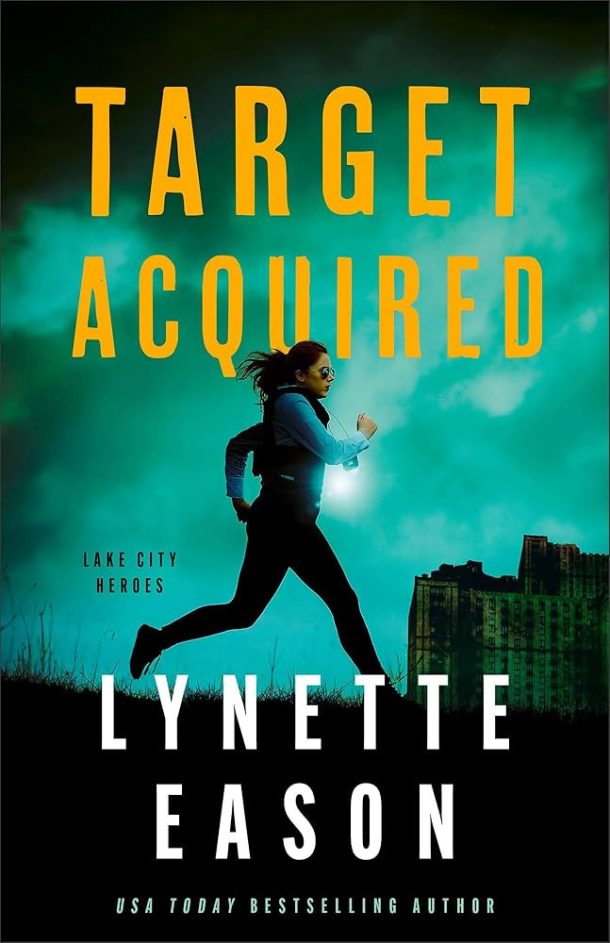 Target Acquired by Lynette Eason
Target Acquired by Lynette Eason
Eason’s taut second Lake City Heroes novel (after Double Take) finds the newest member of the Lake City, N.C., SWAT team caught between a cold case and a more pressing threat to her life. As the only woman on her team, medic Kenzie King knows her arrival has rocked the boat but is committed to the job. It becomes harder to focus on her work, however, after a car nearly runs her over and she spots a stalker loitering outside her house. SWAT team leader Cole Garrison sticks close by as he and Kenzie work to crack the case. The culprit proves elusive, but the pair is kept busy as new information comes to light about Kenzie’s mother’s death 20 years ago in a car crash that, it turns out, may not have been an accident. As Kenzie and Cole uncover details about the ugly feud between their grandparents that may have played a role in her mother’s death, they wonder what that case has to do with the danger Kenzie’s in, and whether they can draw on their faith to find the connection before it’s too late. Eason skillfully metes out details of the families’ backstories, adding depth to a zippy plot teeming with buried secrets, dredged-up traumas, and bad actors hiding in plain sight. The result is a thrill ride worth taking. Publisher’s Weekly, June 2024
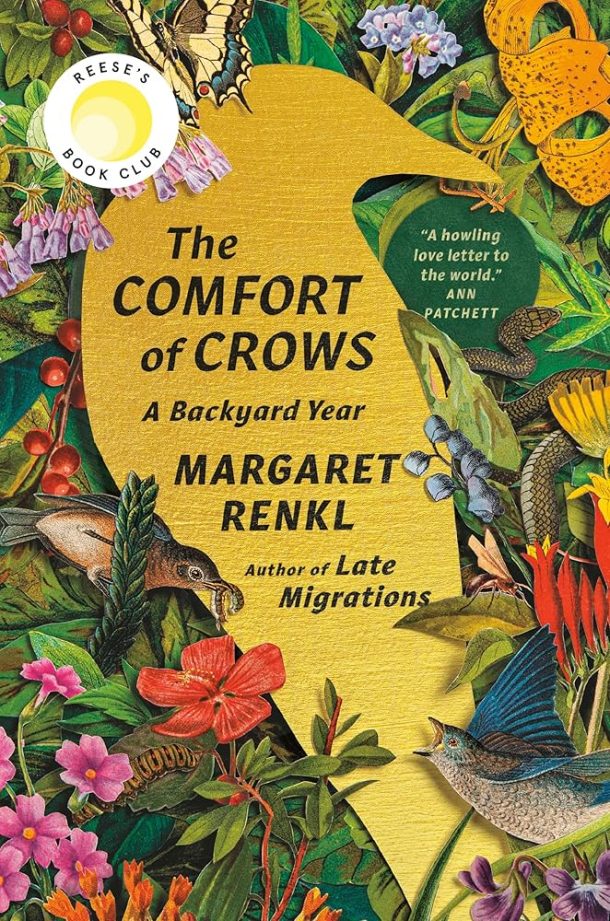 The Comfort of Crows by Margaret Renkl
The Comfort of Crows by Margaret Renkl
New York Times columnist Renkl (Late Migrations) invites readers along on a year of loving outdoor observations in this gently moving memoir. In 52 essays—one per week—Renkl reflects on what she saw and experienced in her Nashville garden over the course of 2022, ruminations that sometimes give way to sense memories of urban parks, a borrowed cabin, and her childhood home in Alabama. Balancing lyrical descriptions of unusual insects and bird-feeder maintenance (“The only thing to do when a Cooper’s hawk stakes out a feeder is to take the feeder down…. The hawk and the owl must eat, too, I know, but I don’t wish to make their bloody work any easier”) with rigorous environmentalist queries, she nudges readers to interrogate their place in the natural world. Quandaries abound: Are people more important than the wild foxes made ill from poisons set out to kill their prey? Should people interfere to rescue a baby bird or let its natural predators claim it? Rather than answer those questions, Renkl lets them hang, leaving readers to think them through for themselves. This gorgeous reflection on humanity’s symbiotic relationship with the outdoors will transform the way readers interact with their own backyards. Publishers Weekly, August 2023
 Thank You For Listening by Julia Whelan
Thank You For Listening by Julia Whelan
Author and Golden Voice Julia Whelan uses aspects of her own career to tell the story of Sewanee, an actress turned romance audiobook narrator who is recovering emotionally from a tragic accident. Having moved on to other genres, Sewanee resurrects her old pseudonym to narrate a beloved romance writer’s last novel and, in doing so, works with the industry’s most popular and secretive male narrator. The two form a deep connection over texts and emails, but when their identities are revealed, everything comes into question. Details of audiobook narration are balanced with palpable emotion voiced in an impressive range. This is best exemplified when a waiter exclaims that he can’t believe Sewanee voiced every character in an audiobook, and Whelan deepens her register, slipping into the male protagonist’s voice to prove it. Winner of AudioFile Earphones Award. AudioFile, 2022
Return to top


